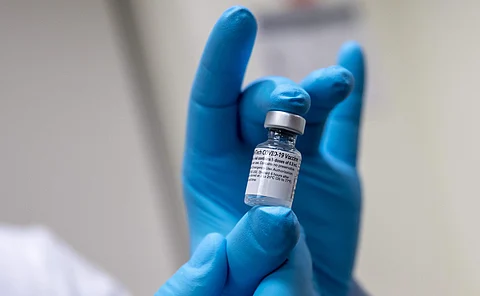

People who take a commonly-prescribed medicine for inflammatory bowel disease (IBD) should not assume they are protected after the first dose of the COVID-19 vaccine, according to a study that found many such people had poor antibody response.
The study, published in the journal GUT, measured antibody response after vaccination with the Pfizer/BioNTech or the Oxford/AstraZeneca COVID-19 vaccine in 865 people treated with infliximab, an anti-tumour necrosis factor (anti-TNF) drug, prescribed to around two million people worldwide.
Anti-TNF drugs are effective treatments for immune-mediated inflammatory diseases, according to researchers from Imperial College London and the University of Exeter in the UK.
However, by suppressing the immune system, they can reduce vaccine effectiveness and increase the risk of serious infection, they said.
The team found that people treated with infliximab had significantly lower concentrations of antibodies when compared to 428 people on an alternative treatment, vedolizumab.
"This is a really important study, showing that a single dose of SARS-CoV2 vaccine is insufficient to generate protective antibody responses in patients treated with anti-TNF drugs," said Nick Powell, co-senior author of the study from Imperial's Department of Metabolism, Digestion and Reproduction.
"This is important because millions of people around the world take these drugs.
Reassuringly, in patients who had been given a second dose of vaccine, most of them mounted excellent responses," Powell said.
The study recruited 6,935 patients with Crohn's disease and ulcerative colitis from 92 UK hospitals between September and December 202.
The researchers investigated the impact of these drugs on COVID-19 susceptibility and protective immunity that follows infection or vaccination.
The researchers noted that vaccines work by stimulating the immune system to produce antibodies that protect individuals from any future infection.
For a vaccine to be effective, it needs to trigger a sufficient number of virus-targeting antibodies to prevent any subsequent infection, they said.
After a single dose of the vaccine, only about one third (103) of 328 participants treated exclusively with infliximab generated adequate levels of antibodies to the virus for the vaccine to be considered effective.
In participants simultaneously taking infliximab and immunomodulatory drugs, such as azathioprine or methotrexate, the levels of antibodies were even lower after a single vaccine dose.
The study found that only 125 of 537 participants in the group met the threshold of a positive antibody test.
However, in a sub-group of people who had previously been infected with COVID-19, and also in the few patients who had already had a second dose of vaccine, the antibody responses rose significantly, indicating an effective response after two exposures.
Based on these observations, the researchers conclude that people taking anti-TNF drugs should be considered a priority for the second dose of vaccination.
Previously, the study found that infliximab blunts the immune system to COVID-19 infection, potentially increasing the risk of reinfection.
The study lead author Tariq Ahmad, from the University of Exeter, noted that poor antibody responses to a single dose of vaccine expose these patients to a potential increased risk of COVID-19.
"However, we found much higher antibody levels in people vaccinated after a previous COVID-19 infection and in the small number of patients who had received two vaccine doses suggesting that all patients receiving these drugs should be prioritised for optimally timed second doses," Ahmad added.
